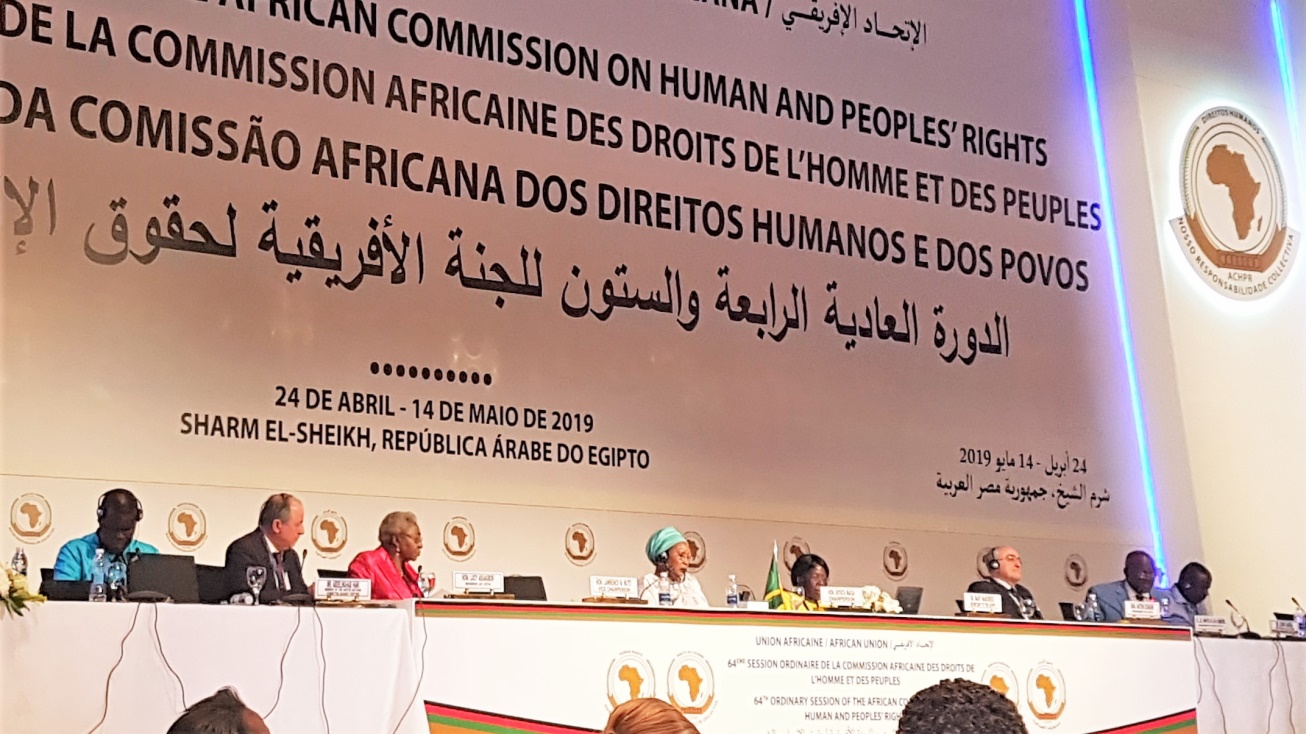
Location
Sharm El Sheikh, EgyptAttendance
Public
Date & Time
Start: 27/04/19 00:00
End: 27/04/19 00:00
On 27 April 2019, the Committee for the Prevention of Torture in Africa (CPTA) of the African Commission on Human and Peoples’ Rights, together with the Convention against Torture Initiative (CTI), organised a panel discussion entitled Supporting State action against torture and ill-treatment in Africa. The discussion took place as […]
On 27 April 2019, the Committee for the Prevention of Torture in Africa (CPTA) of the African Commission on Human and Peoples’ Rights, together with the Convention against Torture Initiative (CTI), organised a panel discussion entitled Supporting State action against torture and ill-treatment in Africa. The discussion took place as part of the African Commission’s 64th Ordinary Session, hosted by the Government of Egypt in Sharm El Sheikh.
The plenary discussion sought to inspire solidarity for the regional ratification of the UN Convention against Torture and Other Cruel, Inhuman or Degrading Treatment or Punishment (UNCAT) by all African countries and to improve implementation of UNCAT and the African Charter on Human and Peoples’ Rights (the African Charter).
Commissioner Hatem Essaiem, Chairperson of the CPTA, opened the discussion underlining that the prohibition of torture and other ill-treatment enjoys widespread support across Africa: 50 out of 54 African States are parties to the UN Convention and 53 have ratified the African Charter, prohibiting torture and ill-treatment in Article 5. Panelists shared the positive trend towards regional universality of UNCAT ratification and implementation, with 6 African States having ratified the Convention in the past five years alone.
Panelists outlined how African States can rely on the support and assistance from a range of actors. At regional level, Commissioner Lucy Asuagbor, member of the CPTA, highlighted the CPTA’s commitment to support African States in realising the prohibition of torture and ill-treatment, including through the adoption of General Comments, Guidelines, Resolutions and other declaratory instruments designed to provide further guidance and clarity to States on issues pertinent to the prohibition. Mr Hani, member of the UN Committee against Torture, reminded participants that torture is not an issue that is imposed on States, but something that States can and should prevent. The UN Committee against Torture is working with States to prevent torture and ill-treatment, including through clarifying international standards and through its periodic reporting procedure. CTI also stands ready to support African States through diplomatic and technical cooperation.
Invited panelist, Mr. Marenah, Solicitor General of The Gambia, highlighted how CTI supported The Gambia in its efforts to ratify UNCAT. Participants heard how for The Gambia, ratification of UNCAT in 2018 was part of a promise that the Government would never again let torture and ill-treatment be used as tools of repression. Ongoing legislative reform, including of The Gambia’s criminal code, will include introducing a definition as part of a crime of torture.
Speaking on Ghana’s experiences of implementing UNCAT as well as the Optional Protocol, and as a Core CTI State, Ghana’s Ambassador to The Arab Republic of Egypt, Dr. Winfred Nii Okai Hammond explained how ratification has triggered multi-sector reform, including of Ghana’s judicial, police and prison services, culminating in many positive changes, such as professionalism of the police, a more efficient justice delivery system, human rights compliant prison services and transparent and accountable prisons.
The discussion highlighted how such reforms allow States to gradually achieve compliance, underscoring that ratification of relevant instruments, including UNCAT and the African Charter, was the first step in a journey towards full compliance.
“At CTI, we strongly believe that regional universality of UNCAT ratification in Africa will put all countries in a better position to minimise risks of torture and similar ill-treatment. By ratifying and implementing the Convention, a country sends a powerful message of commitment, and we at CTI stand ready to work with you,” said H.E. Dr. Winfred Nii Okai Hammond, Ambassador of Ghana to The Arab Republic of Egypt ( with concurrent accreditation to Lebanon, Sudan and Eritrea) and on behalf of the CTI Core States.
The Discussion Concept Note and Agenda are available here.
Background
Panelists included Commissioner Hatem Essaiem, Chairperson of the CPTA; Commissioner Lucy Asugabor, CPTA member; H.E. Dr. Winfred Nii Okai Hammond, Ambassador of Ghana to The Arab Republic of Egypt ( with concurrent accreditation to Lebanon, Sudan and Eritrea); Mr Cherno Marenah, Solicitor General and Legal Secretary, Ministry of Justice, The Gambia; and Mr Abdelwahab Hani, Member of the UN Committee against Torture. Representatives of more than 20 African States as well as delegates of international institutions and civil society participated in the discussion.
The CPTA was established by the African Commission to promote the absolute prohibition of torture and ill-treatment as enshrined in the African Charter on Human and Peoples’ Rights, and is the Continent’s principal mechanism to support and guide States in their efforts to give effect to the prohibition of torture and ill-treatment at national level.
Founded in 2014, CTI is a cross-regional, inter-governmental initiative led by Chile, Denmark, Fiji, Ghana, Indonesia and Morocco, to advance global ratification and active implementation of UNCAT by 2024. It is supported by a full time Secretariat based in Geneva. As an initiative from States for States, CTI works with States through international cooperation, confidential dialogue and by providing technical assistance, including through the Secretariat’s remote help desk. For further information on CTI, visit us on www.cti2024.org or contact us at info@cti2024.org.
CPTA and CTI have collaborated closely since CTI was founded in 2014, including in relevant activities carried out across Africa in which 36 African countries have participated to date.
Copy of CTI’s contribution to the CPTA’s newsletter is available here.







